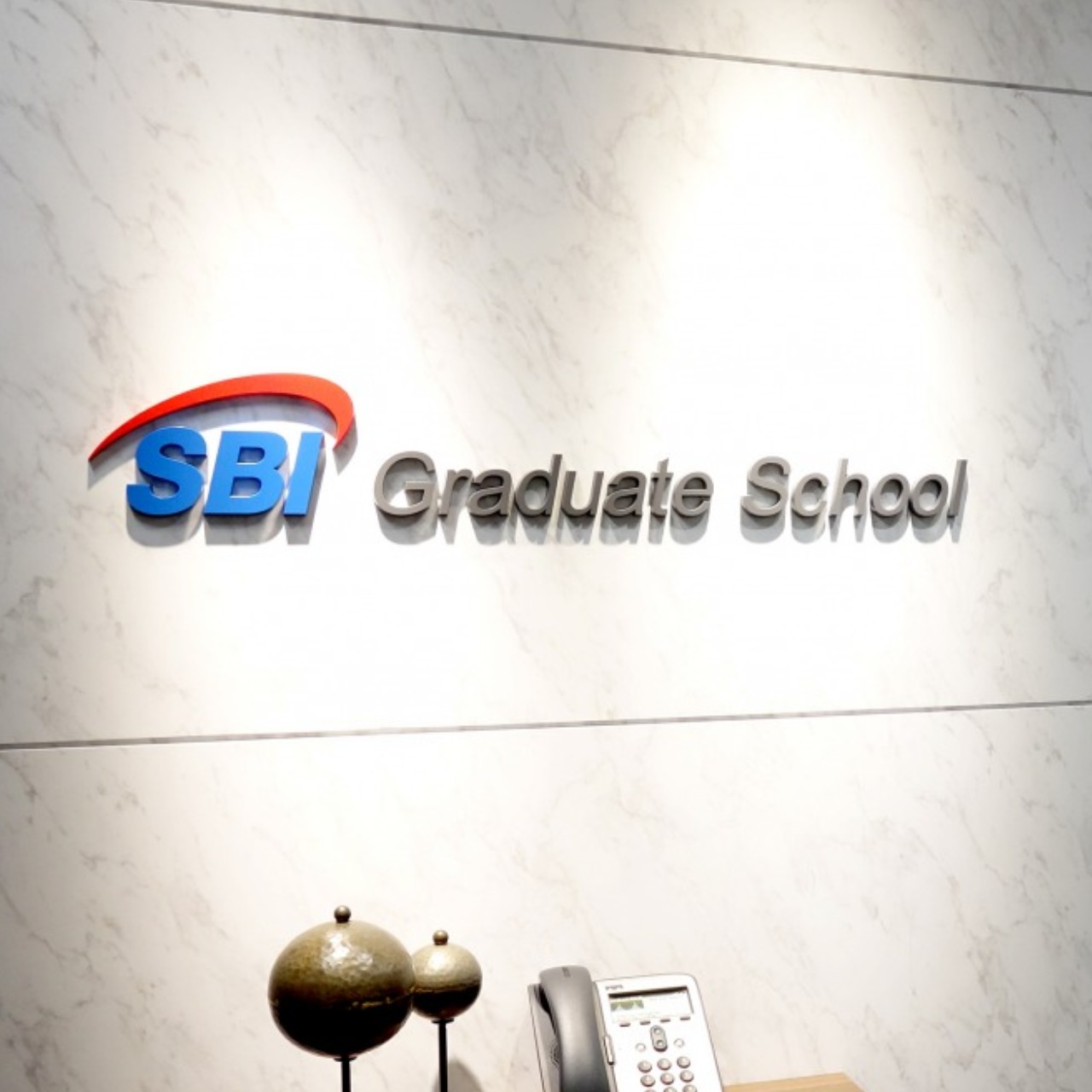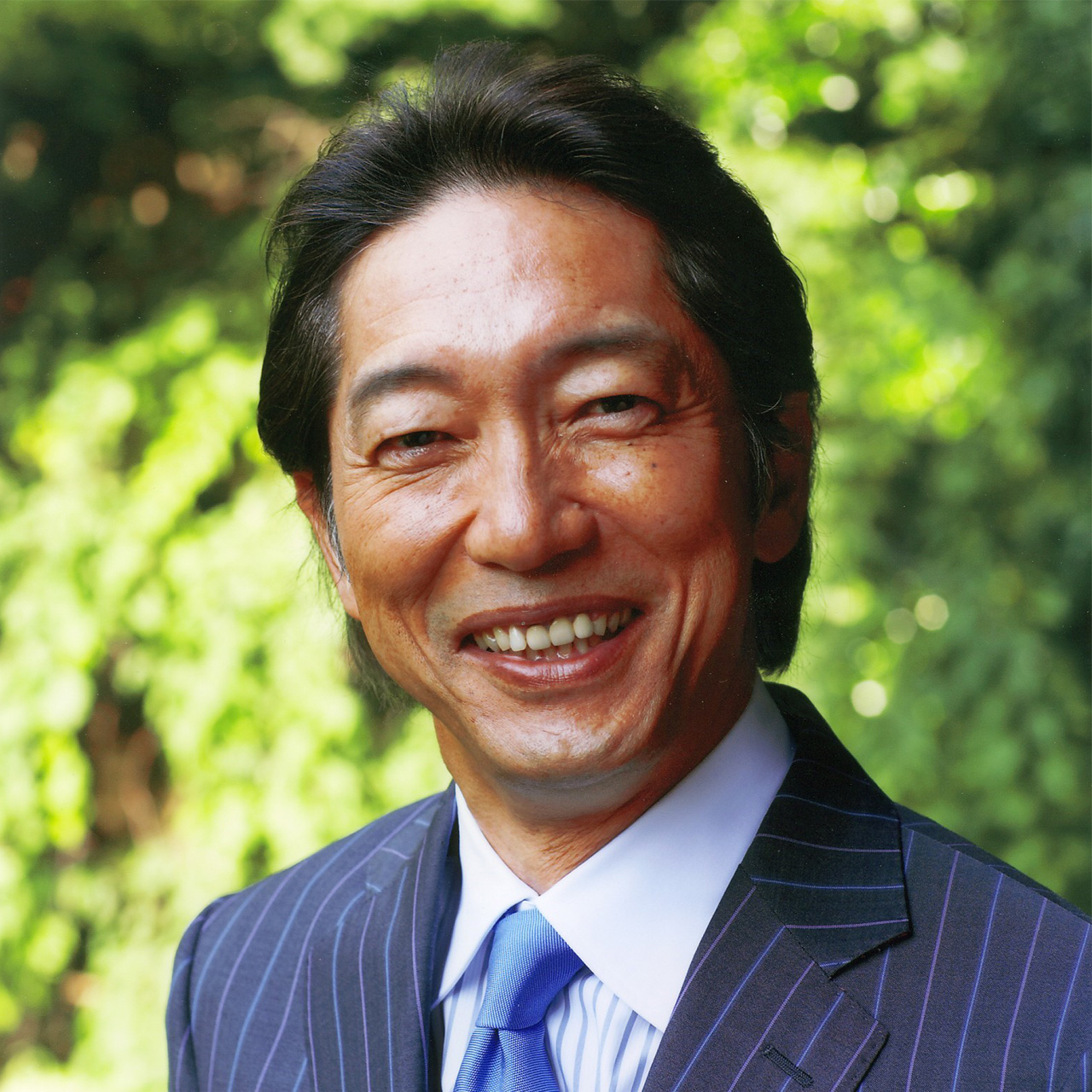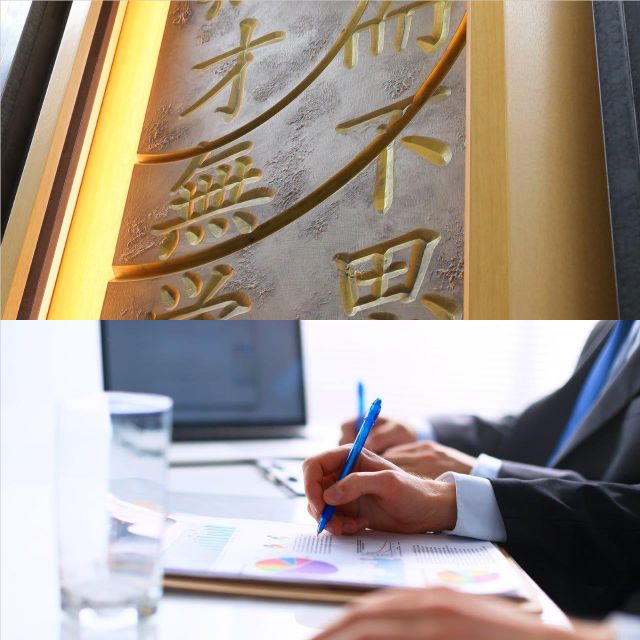Who We Are

SBI Graduate School is a professional graduate school authorized by the Ministry of Education,
Culture, Sports, Science and Technology (MEXT) as a distance learning (online) college.
Students who complete the program are conferred with a Master of Business Administration(MBA).
All subject lectures and assignments can be done via our online study system that is
multi-device compatible. SBI Graduate School has a campus in Tokyo as well as an interactive
learning hub that utilizes the web conference system for discussions and presentations.
As SBI Graduate School is not bound by constrictions such as time and place, we offer effective learning
and make it possible for business people to study while continuing to work.
| Established by | Educational Corporation of SBI Graduate School |
|---|---|
| Name | SBI Graduate School |
| President | Seiichi Kanise |
| Course/Major | Business Management Course/Major in Entrepreneurship |
| Academic degree | Master of Business Administration (MBA) (professional) |
| Intake quota | 120 regular-course students (Intake in spring and autumn) |
| Type of university | Professional graduate school (distance learning) |
| Number of years of study | Two years (standard) |
| Others | Lectures designated by the Ministry of Health, Labour and Education for the Educationand Training Benefits Plan/Admission Fee Exemption scheme/Reduction or exemption of tuition fees/Eligibility for Japan Student Services Organization (JASSO) scholarships |
| Website | www.sbi-u.ac.jp |
| Address | Izumi Garden Tower 21F, 1-6-1 Roppongi, Minato-ku, Tokyo, 106-6021, JAPAN |
| TEL | +81-3-6229-1175 |
| FAX | +81-3-6685-6100 |
History

May 2006 | Establishment of SBI University Co., Ltd., with the objective of nurturing human resources preparations for establishment of the Graduate School |
April 2007 | Application to establish graduate school lodged with MEXT (Ministry of Education, Culture, Sports, Science and Technology) for the establishment of the Graduate School |
December 2007 | Approval granted by MEXT to establish SBI Graduate School |
April 2008 | Opening of SBI Graduate School (Yokohama, Kanagawa) |
September 2009 | Introduction of Tuition Reduction Scheme |
March 2010 | Graduation of Inaugural Class |
April 2010 | Establishment of Individual Unit Courses |
April 2011 | Introduction of Long-Term Enrollment Program |
October 2011 | Establishment of Diploma Course (current Pre-MBA Course) |
July 2015 | Establishment of SBI-U Venture Challenge System |
April 2016 | Relocation of campus (Marunouchi, Tokyo) |
October 2016 | Establishment of Graduate Seminars “Organization Development and Change” Establishment of SBI Graduate School Financial Research Institute |
April 2018 | 10th anniversary of SBI Graduate School’s establishment |
October 2018 | Establishment of Graduate Seminars “Master’s Thesis Seminar” |
April 2021 | Relocation of campus (Roppongi, Tokyo) |
| Reorganization of SBI Graduate School Financial Research Institute (Transfer to SBI Financial and Economic Research Institute Co., Ltd.) | |
April 2022 | Establishment of Certification Program |
Message from the Chairman

Managing a company and setting up a business are both people’s activities. I have seen various businesses and met with many company CEOs over the years, and from my own experience, I strongly feel that the most important thing for CEOs is to learn moral philosophy. A business cannot be operated by one person alone.
A business will not succeed unless you can gain a favorable response from many people and join forces, moving together in the same direction and sharing the same aspirations. In other words, I feel that the most important criterion in making a business a success is the personality of the CEO. As written in the Analects of Confucius, “Virtue never stands alone. It is bound to have neighbors.” People of virtue are never solitary because sympathizers and those with understanding will always appear by their side. To learn moral philosophy is necessary not only for CEOs but for those people in the organization who are looked to for leadership. Of course, just studying moral philosophy alone is not enough. Practical business administration that captures the current trends, or in other words incorporates an awareness of current affairs, must be acquired as knowledge and techniques.
At this graduate school, we provide students with the opportunities to learn both moral philosophy and practical business administration. We endeavor to foster the next generation of leaders who can forge a path forward for a new society, and cultivate an ability to see through to the real essence of matters, possess the prescience to foresee the times together with big-picture thinking skills, and develop solid evaluation standards. We look forward to learning together with people with clear aims and aspirations.
A business will not succeed unless you can gain a favorable response from many people and join forces, moving together in the same direction and sharing the same aspirations. In other words, I feel that the most important criterion in making a business a success is the personality of the CEO. As written in the Analects of Confucius, “Virtue never stands alone. It is bound to have neighbors.” People of virtue are never solitary because sympathizers and those with understanding will always appear by their side. To learn moral philosophy is necessary not only for CEOs but for those people in the organization who are looked to for leadership. Of course, just studying moral philosophy alone is not enough. Practical business administration that captures the current trends, or in other words incorporates an awareness of current affairs, must be acquired as knowledge and techniques.
At this graduate school, we provide students with the opportunities to learn both moral philosophy and practical business administration. We endeavor to foster the next generation of leaders who can forge a path forward for a new society, and cultivate an ability to see through to the real essence of matters, possess the prescience to foresee the times together with big-picture thinking skills, and develop solid evaluation standards. We look forward to learning together with people with clear aims and aspirations.
Yoshitaka Kitao
Message from the President

The world is now entering an era of great transformation. We have seen the outbreak of the COVID-19 pandemic, the war in Ukraine, a US-China conflict and the digital information revolution — all of these are events that shake our society, our values and our common sense from the ground up.
What is required for business management to survive such a paradigm shift? Having covered the world's politics and economy and corporate ups and downs as a journalist, I believe the answer is “integrated knowledge” that includes the natural sciences, the humanities and the social sciences. In other words, it is an improvement of “human qualities.”
SBI Graduate School, which aims to cultivate future entrepreneurs and top management, is a very unique place where students can not only learn management strategies, organization theory, finance and mathematical science on management from faculty members with extensive practical experience, but also gain integrated knowledge of global business, history, corporate ethics and management philosophy through online courses that are not bound by time or place. We have already sent many business leaders out into society.
We hope you will challenge yourself to further growth at SBI Graduate School.
What is required for business management to survive such a paradigm shift? Having covered the world's politics and economy and corporate ups and downs as a journalist, I believe the answer is “integrated knowledge” that includes the natural sciences, the humanities and the social sciences. In other words, it is an improvement of “human qualities.”
SBI Graduate School, which aims to cultivate future entrepreneurs and top management, is a very unique place where students can not only learn management strategies, organization theory, finance and mathematical science on management from faculty members with extensive practical experience, but also gain integrated knowledge of global business, history, corporate ethics and management philosophy through online courses that are not bound by time or place. We have already sent many business leaders out into society.
We hope you will challenge yourself to further growth at SBI Graduate School.
Seiichi Kanise
Two Distinguishing Features

1. The pursuit of moral philosophy required for business administration
Through the interpretation in a contemporary context of ancient Chinese texts , students will become equipped with an ability to see through the essential nature of matters, the foresight to see things ahead of time, and a way of thinking based on a broader perspective. These endow them with the unswerving basis for judgement requisite for the next generation of entrepreneurs and leaders.
Through the interpretation in a contemporary context of ancient Chinese texts , students will become equipped with an ability to see through the essential nature of matters, the foresight to see things ahead of time, and a way of thinking based on a broader perspective. These endow them with the unswerving basis for judgement requisite for the next generation of entrepreneurs and leaders.
2. Creation of plans for business projects as a compilation of study
As the final compilation of study for the MBA program, a business plan is formulated and presented at Graduate Seminars. Conducted in a small-group seminar format with meticulous support, business plans that have a high possibility of realization are created.
As the final compilation of study for the MBA program, a business plan is formulated and presented at Graduate Seminars. Conducted in a small-group seminar format with meticulous support, business plans that have a high possibility of realization are created.
Your business plan could be eligible for funding!

Out of the business plans created during the Business Plan Exercise* plans that were judged to
be excellent will be awarded the necessary financial support for starting up and so on, by SBI
Group company. In addition, support will be given for matching up business partners and clients.
An environment will be readied to provide total support for realizing your business plan.
*During the Business Plan Exercise, students will be given multifaceted business support such
as provision of funding, retail support, and introduction of collaborators, by utilizing venture
development infrastructure from SBI Investment, one of Japan’s leading venture capital
companies, and other companies in the SBI Group.
be excellent will be awarded the necessary financial support for starting up and so on, by SBI
Group company. In addition, support will be given for matching up business partners and clients.
An environment will be readied to provide total support for realizing your business plan.
*During the Business Plan Exercise, students will be given multifaceted business support such
as provision of funding, retail support, and introduction of collaborators, by utilizing venture
development infrastructure from SBI Investment, one of Japan’s leading venture capital
companies, and other companies in the SBI Group.
The School Motto
To develop "talented human resources" who will bring vitality to the Japanese and global economy and society by targeting aspiring business people.
Purpose of Establishment of the School
The School will contribute to the development of humanity and culture by providing opportunities for diverse learners to study through distance education using the media, and by fostering deep learning and outstanding abilities for occupations that require expertise, as well as to develop capable human resources who will shape the nation and society.
Educational Principles
In order to foster ideal personnel that society is in need of, together with practical studies that have been substantiated by theory, we attach a great deal of importance to moral education for cultivating strength of character and an ethical sense of values which is an essential quality for a businessperson.
Through education aiming to achieve acquisition of these qualities, we will contribute to the realization of a rich and harmonious society by fostering professional human resources who can demonstrate leadership in the global community.
Through education aiming to achieve acquisition of these qualities, we will contribute to the realization of a rich and harmonious society by fostering professional human resources who can demonstrate leadership in the global community.
Mission Statement
Our mission is, through education and research that fuses theory and practice related to business management, to nurture management professionals who possess high-level professional knowledge, an appropriate sense of judgment, interpersonal skills, self-management ability and ethical standards so that they can demonstrate leadership for creating new business in the global community and achieve sustainable development.
Five Learning Goals
In order to nurture human resources as given in the Mission Statement, we have set the following five learning goals.
- To learn about business administration theory which is the basis of management, and to foster an ability for understanding by linking it with practical business.
- To polish analytical ways of thinking and the ability to recognize issues, and to develop abilities to utilize specialized knowledge and practical skills.
- To foster interpersonal understanding skills and management skills, and strengthen the ability to administer an organization.
- To understand trends in globalization and the development of IT, and to foster foresighted leadership and flexibility needed according to changes in the times.
- To understand management by drawing a connection between its historical context and cultural background, and to cultivate knowledge conducive to appropriate character formation for leaders.
Three Policies
Admission Policy (the type of students we are seeking)
We are seeking the following types of student, based on the Mission Statement.
To achieve the Mission Statement, a curriculum has been compiled with the following policies. To study systematically about knowledge needed for business administration, the following groups of subjects including Strategy and Marketing, Organization and Human Resources, Finance, Management Mathematics and Problem Solving, Business Ethics and Management Philosophy, Global Business have been set up. Each group is organized into applicable subjects divided into three stages: core subjects which includes compulsory subjects; applied subjects; and developmental subjects. Students can be flexible in choosing the subjects they need to study, depending on their knowledge and experience. In addition, by actually putting into practice in the real world what they have learned, they can deepen their understanding through discussions with other students and improve competencies (behavioral characteristics) required of management professionals.
Diploma Policy (Conferring of Degrees)
Students who have attended for two years or more and acquired all the credits necessary, including for the compulsory subjects, as well as having fulfilled the following conditions, shall be conferred with a Master of Business Administration (Professional).
We are seeking the following types of student, based on the Mission Statement.
- Persons who have already started up a business, as well as adult members of society who are aiming to create a new business.
- Persons who aim to enhance their careers by opening up a new market or creating a new business within an organization.
- Persons who aim to be active in a global environment as management professionals who have leadership skills.
To achieve the Mission Statement, a curriculum has been compiled with the following policies. To study systematically about knowledge needed for business administration, the following groups of subjects including Strategy and Marketing, Organization and Human Resources, Finance, Management Mathematics and Problem Solving, Business Ethics and Management Philosophy, Global Business have been set up. Each group is organized into applicable subjects divided into three stages: core subjects which includes compulsory subjects; applied subjects; and developmental subjects. Students can be flexible in choosing the subjects they need to study, depending on their knowledge and experience. In addition, by actually putting into practice in the real world what they have learned, they can deepen their understanding through discussions with other students and improve competencies (behavioral characteristics) required of management professionals.
Diploma Policy (Conferring of Degrees)
Students who have attended for two years or more and acquired all the credits necessary, including for the compulsory subjects, as well as having fulfilled the following conditions, shall be conferred with a Master of Business Administration (Professional).
- Students who have acquired academic standards in theory for special fields of business administration, and can apply that to resolving problems in business and management.
- Students who have a high level in the main competencies (behavioral characteristics) sought after in management professionals.
Learning Style
Because you are so busy, we support your learning 360 degrees via the Internet and in person.
* All lectures are conducted in Japanese.
1. Online classes
Study in your own style because classes are online.
You can study anytime and anywhere on a computer or mobile device with our online study system. If you are busy with work or finding it difficult to free up a block of time, you can create your own study schedule to suit your lifestyle so you can study on your commute, during your lunch hour and when you have more free time on weekends.
One class consists of 90 minutes for the lecture and 30 minutes for the assignment.
Classes consist of 90 minutes viewing time for a lecture and assignments that take about 30 minutes. The assignments vary in format depending on the subject and may consist of a small test to check for understanding and a written report, or group discussions with fellow students and groupwork.
Earning credits by passing the end-of-semester examination
Subjects worth one credit are composed of 7 classes of 90 minutes and the period extends over a 2.5 month period (subjects worth two credits take approx. 5 months). After viewing the lecture and completing the assignments each time, the end-of-semester examination is held and classes then finish. After viewing all the lectures (= attending all the lectures) and passing the allotted assignments and the end-of-semester examination, you can obtain the credit for that subject.
Enabling deep learning through an interactive learning system
The learning style of SBI Graduate School is not simply a convenient way of completing learning with self-study by viewing lectures, conducting examinations and submitting reports. It is an interactive learning hub where instructors and students have exchanges including discussions using the discussion board and the web conference system, as well as collective style face-to-face classes that improve practical skills.
2. Face-to-face classes
Face-to-face classes that polish practical business skills.
For one-credit subjects (7 classes), on average there is one face-to-face class while for two-credit subjects (15 classes), on average there are one or two face-to-face classes.
Skills for presentations and discussions, which can only be done in face-to-face classes, are fully strengthened.
Face-to-face classes focus on discussions and a variety of case studies are examined. These classes also offer the opportunity for students to polish practical skills through project presentations and individual feedback. Students located far away from the campus or those participating from outside of Japan can take part via the online conference system.
Online or in person, you can choose the style that suits you
Face-to-face classes are mainly held in seminar rooms at SBI Holdings. Students located far away from the campus or those unable to come to the seminar room on the day classes are scheduled can take part via the online conference system.
3. Suited to students located in regional areas or outside of Japan
This online network connects and enables students to participate all over the world
This borderless learning environment is possible because SBI Graduate School students do not have to actually come to the campus.
Students attending SBI Graduate School and participating in discussions via the Internet come from all over Japan as well as Asia, Europe and South America.
4. A model for the completion of studies
A schedule model for obtaining an MBA over a two-year period, while continuing to work.
At SBI Graduate School, the curriculum is based on one year being divided into the spring semester and autumn semester and each semester being further divided into the first half and second half. To obtain an MBA in the two-year period, students must acquire 17 credits per year. This means attending classes during the first half and second half of each semester to acquire
4-5 credits each, making a total of 17 credits for the entire year. A total of 15-20 hours of learning per week is required*.
*Depending on the subject, the length of the lecture video and the content of the assignments may differ, in which case the number of hours for learning will vary.
For those who are worried about not having enough time to study
Using the long-term student enrollment program, it is possible to extend the registration period for the MBA program up to four years, instead of the usual two years. We recommend this style for busy working people seeking ways to continue studying in any easy manner with no need to physically attend classes.
* All lectures are conducted in Japanese.
1. Online classes
Study in your own style because classes are online.
You can study anytime and anywhere on a computer or mobile device with our online study system. If you are busy with work or finding it difficult to free up a block of time, you can create your own study schedule to suit your lifestyle so you can study on your commute, during your lunch hour and when you have more free time on weekends.
One class consists of 90 minutes for the lecture and 30 minutes for the assignment.
Classes consist of 90 minutes viewing time for a lecture and assignments that take about 30 minutes. The assignments vary in format depending on the subject and may consist of a small test to check for understanding and a written report, or group discussions with fellow students and groupwork.
Earning credits by passing the end-of-semester examination
Subjects worth one credit are composed of 7 classes of 90 minutes and the period extends over a 2.5 month period (subjects worth two credits take approx. 5 months). After viewing the lecture and completing the assignments each time, the end-of-semester examination is held and classes then finish. After viewing all the lectures (= attending all the lectures) and passing the allotted assignments and the end-of-semester examination, you can obtain the credit for that subject.
Enabling deep learning through an interactive learning system
The learning style of SBI Graduate School is not simply a convenient way of completing learning with self-study by viewing lectures, conducting examinations and submitting reports. It is an interactive learning hub where instructors and students have exchanges including discussions using the discussion board and the web conference system, as well as collective style face-to-face classes that improve practical skills.
2. Face-to-face classes
Face-to-face classes that polish practical business skills.
For one-credit subjects (7 classes), on average there is one face-to-face class while for two-credit subjects (15 classes), on average there are one or two face-to-face classes.
Skills for presentations and discussions, which can only be done in face-to-face classes, are fully strengthened.
Face-to-face classes focus on discussions and a variety of case studies are examined. These classes also offer the opportunity for students to polish practical skills through project presentations and individual feedback. Students located far away from the campus or those participating from outside of Japan can take part via the online conference system.
Online or in person, you can choose the style that suits you
Face-to-face classes are mainly held in seminar rooms at SBI Holdings. Students located far away from the campus or those unable to come to the seminar room on the day classes are scheduled can take part via the online conference system.
3. Suited to students located in regional areas or outside of Japan
This online network connects and enables students to participate all over the world
This borderless learning environment is possible because SBI Graduate School students do not have to actually come to the campus.
Students attending SBI Graduate School and participating in discussions via the Internet come from all over Japan as well as Asia, Europe and South America.
4. A model for the completion of studies
A schedule model for obtaining an MBA over a two-year period, while continuing to work.
At SBI Graduate School, the curriculum is based on one year being divided into the spring semester and autumn semester and each semester being further divided into the first half and second half. To obtain an MBA in the two-year period, students must acquire 17 credits per year. This means attending classes during the first half and second half of each semester to acquire
4-5 credits each, making a total of 17 credits for the entire year. A total of 15-20 hours of learning per week is required*.
*Depending on the subject, the length of the lecture video and the content of the assignments may differ, in which case the number of hours for learning will vary.
For those who are worried about not having enough time to study
Using the long-term student enrollment program, it is possible to extend the registration period for the MBA program up to four years, instead of the usual two years. We recommend this style for busy working people seeking ways to continue studying in any easy manner with no need to physically attend classes.
Application Eligibility
A graduate of a four-year university or an equivalent scholastic achievement, and experience of working at a full-time job for three years or longer, or those recognized in the entrance screening as having the equivalent.
Graduates of a four-year university or those possessing an equivalent scholastic achievement fall under one of the following items.
Graduates of a four-year university or those possessing an equivalent scholastic achievement fall under one of the following items.
- You have graduated from a university in Japan.
- You have received a bachelor degree from the National Institution for Academic Degrees and University Evaluation in Japan.
- You have completed school education for 16 years outside Japan. (In case of admission to a doctoral program in medicine, dentistry, pharmacy, and veterinary medicine, you need to have completed 18 years of school education outside Japan.)
- You have completed in Japan distance education courses provided by a foreign school for 16 years (18 years in case of the admission to doctoral program in medicine, dentistry,pharmacy, and veterinary medicine).
- You have completed an education program provided by a foreign school in Japan which is designated by MEXT as being equivalent to a foreign university (“Japanese branch of foreign university designated by MEXT”).
- You have completed an education program with a course term of three years or more at a university outside of Japan (three years in case of the admission to doctoral program in medicine, dentistry, pharmacy, and veterinary medicine) and been conferred with a degree equivalent to a bachelor’s degree.
- You have completed a specialized course at a specialized training college that is designated by MEXT.
- You have graduated from a university in Japan under the old system of education.
- You have graduated from the higher education institutions established by government ministries such as National Defense Academy, Japan Coast Guard Academy, and Meteorological College.
- You are 22 years of age or older and have received special permission for admission to this graduate school based on the individual screening for admission eligibility*.
*You must submit the slip from the screening for admission eligibility.
